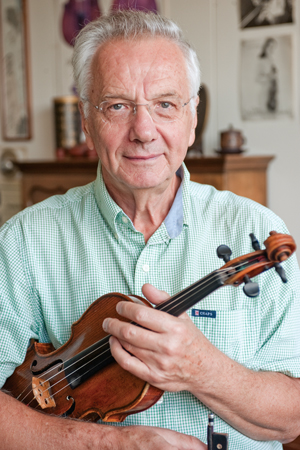Orchestrating Success
CFA’s Yuri Mazurkevich as artist and teacher

Freedom of expression. Freedom to travel. Freedom to live an intellectually stimulating, professionally challenging life. That quest for freedom impelled Yuri Mazurkevich and his wife, Dana, to leave the Soviet Union in the mid-1970s and head west.
The College of Fine Arts professor of music quickly established himself as a sought-after recitalist and teacher, and in 1985 he joined the faculty of the School of Music, where Dana Mazurkevich, an associate professor of music, also teaches. For 25 years, Yuri Mazurkevich has helped train a new generation of violinists, many of whom came to BU because they had seen him perform and were eager to study with him.
Founded in 1872, the School of Music holds the distinction of being one of the few music conservatories to be part of a major research university. That, according to Mazurkevich, is what makes the experience for students so rich. “They’re given the chance to explore the world in every direction: intellectual thought, and culture, and politics, and literature,” he says. “It gives students the incredible opportunity to grow not just as musicians in their own profession, but to be informed and accomplished in many fields.”
In taking on a student, Mazurkevich seeks more than a skilled violinist. “I’m looking for a personality, for imaginative and lively expression,” he says. “You can teach proficiency, but it’s almost impossible to teach musical intuition. I’ll listen to someone play, and suddenly there is a sound or phrase that catches my ear or my feelings. And I think, Aha—there is something that would be interesting to work with.”
He works with students one on one, gathering them together every week or two in a studio session, to play for, and critique, each other. “It helps young violinists to develop some skills for playing publicly,” he says. “There are many people who can play very well in class situations, but when they go onstage they have stage fright and everything changes.” Students also give a number of concerts on campus that are open to the general public.
When his students are learning a new piece, Mazurkevich requires them to research the composer and the period. “They have to know the culture, the period, the style,” he says. “The main thing is that after you know something about the piece, and you’ve practiced and know the notes, you have to make sense of the notes. And that’s a matter of interpretation. I always ask them to do independent thinking, and present the piece in such a way that it makes sense and people will enjoy it.”

Mazurkevich studied at the Moscow Conservatory with world-renowned violinist David Oistrakh. Upon graduation, he was sent to teach at the Kiev Conservatory. “In the old Soviet Union, it was a rule that when you finished your higher education, you were directed to go wherever they sent you and work for three years,” he says. “They could send you to Siberia if they wanted to, and you couldn’t refuse. Fortunately, the Ukrainian government asked that three of us from Ukraine be sent there to help with music education.”
In addition to teaching, Mazurkevich won three international competitions and performed in concerts. But he couldn’t go anywhere without KGB approval. “Sometimes they would allow me to go, but my wife couldn’t go with me,” he says. “She’d be back there like a hostage. As performing violinists, it was important for us to see the world and play everywhere and meet other musicians and develop working relationships. I traveled from time to time, but it was always very difficult and unpredictable. Everybody knows now that the Soviet Union was not a beacon of freedom.”
Since Dana Mazurkevich is Jewish, when the Soviet Union began allowing Jews to emigrate in the early ’70s, the Mazurkeviches applied and were permitted to leave. They went to Canada before coming to Boston.
Their careers took off—they often play together as a duo—and in 1990 Mazurkevich was invited to join three other native Ukrainians as part of the Leontovich Quartet. “We played our first concert in New York City at the Frick Museum and got a terrific review in the New York Times,” he says. “We became incredibly successful.” His renown has been of advantage to Boston University. “If you’re getting rave reviews, it adds to the reputation of the school. Talented young people have come here because they heard me play in Hong Kong or Korea or Canada. We are still benefiting from activities that were done 10, 20 years ago.”
Many of his students have gone on to play with prominent orchestras, including the Philadelphia Orchestra, the Orchestre Symphonique de Montréal, and the Toronto Symphony Orchestra. Others have gone on to teach. Still others have chosen careers outside music. “Some decide it would be more practical to go for another profession, and keep music as something they enjoy in their life,” Mazurkevich says. “Success to me is if someone enjoys what they’re doing, whether in music or not in music. If you can keep playing music and enjoy it, but find something else that fulfills you as well, that’s fine too.”
A version of this article originally appeared in the 2010 issue of Research magazine.
Comments & Discussion
Boston University moderates comments to facilitate an informed, substantive, civil conversation. Abusive, profane, self-promotional, misleading, incoherent or off-topic comments will be rejected. Moderators are staffed during regular business hours (EST) and can only accept comments written in English. Statistics or facts must include a citation or a link to the citation.